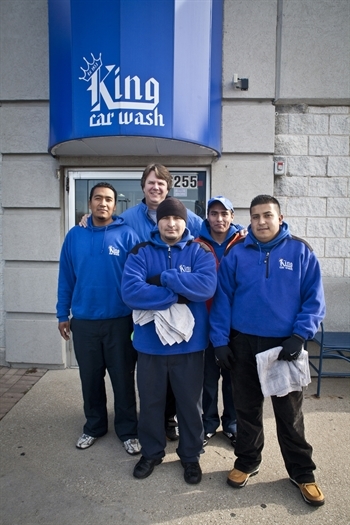
What Our Water's Worth is an ongoing campaign led by the Metropolitan Planning Council and Openlands to raise awareness about the value of water in northeastern Illinois and northwestern Indiana.
Cars – and water – come out clean at King Car Wash

Frank Trilla and his crew at King Car Wash in Westmont, Ill.
Photo Emily Cikanek
Sure, it’s April, but in the Chicago area, that doesn’t necessarily guarantee winter’s snowy onslaught is behind us. Still, most of us can’t help ourselves: We’ve got a bad case of spring fever, and with it the urge to store away winter’s scarves and boots with reckless abandon, throw open the storm windows, and take our salt (and perhaps beet juice) encrusted cars for much-needed TLC at the local car wash.
Frank Trilla, owner of King Car Wash, in Westmont, Ill., is ready for the spring rush. Yet, while most water-intensive businesses fret that more water means more money out the door, Trilla isn’t concerned: For 20 years, King Car Wash has been using the same water over and over again. Family owned and operated since 1953, for the past two decades, Trilla has experimented with five different water recycling systems. “We were doing it before it was cool. We were doing it because it’s the right thing to do,” says Trilla.
Water reuse is a great way to be a steward of our region’s water resources. Did you know we do a lot of things with treated, drinkable water besides drink it? Spraying down sidewalks, watering lawns, flushing toilets—and yes, washing cars—are just a few of the ways we use water we’ve paid to treat to drinking standards. Even worse, most of the time water is used just once before it runs down the drain.
For businesses, reusing water also can add up to significant bottom line benefits. Read on to learn how Trilla and his crew are saving water—and money—by recycling 80 percent of the water the car wash uses every day.
Conservation tips
Support green car washes in your area. Find out what your local carwash does with its water, and support businesses that care about our limited resources.
Reuse grey water at home. Grey water – water that has been used for laundry, dishwashing and bathing – is not drinkable. However, you can save water and money by reusing it in other ways around your property, such as washing your car. Here are some grey water reuse tips.
Wash with biodegradable soaps. Generic soaps typically don’t biodegrade and can put more strain on your community’s water treatment facility, as well as the nearby bodies of water your area’s sewage empties into. Try to invest in organic soaps that have less impact on your area’s ecosystem.
Ask your community leaders about incentives or certification programs for green businesses. Your local community may have ways of rewarding businesses that take sustainability seriously. Check out the Chicago Green Business Bureau, one such certification program that highlights local businesses that are striving to be sustainable.
April 2011
www.chicagolandh2o.org
Upcoming events
| Apr 19 | Building Green Chicago Conference & Expo 7:30 AM–1:00 PM |
|---|---|
| Apr 20 | Great Lakes, Great Threats, Great Opportunities 9:30 AM–4:00 PM |
| Apr 28 | GreenTown Elgin: Conference on the future of community 7:30 AM–6:00 PM |
What Our Water's Worth is an ongoing campaign led by the Metropolitan Planning Council and Openlands to raise awareness about the value of water in northeastern Illinois and northwestern Indiana. From Lake Michigan to the Fox River, how we use our water resources—including what we conserve, how much we waste, and what we choose to invest in water quality—is up to each of us. This is our water—and it's worth more than we know.
WOWW factors
962,500 gallons a day
Some 275 car washes in the Chicago area use an average of 3,500 gallons daily – close to 1,000,000 gallons total each day.
770,000 gallons a day
All of this water – about 80 percent of current total consumption – could be saved if every car wash used a recycling system.
75% of chemicals
According to research at Johns Hopkins University, most potent, bacteria-killing chemicals found in anti-bacterial soaps, which people use and then rinse down their drains, survive treatment at sewage plants.
What Our Water's Worth is a monthly e-newsletter. Tell us what you think. Email info@chicagolandh2o.org with feedback in the subject.
To subscribe, visit our website at chicagolandh2o.org.
To stop receiving this newsletter visit metroplanning.org/unsubscribe.html?
EmailMsgId=118
&email=

|
Metropolitan Planning Council
140 S Dearborn St | Suite 1400 | Chicago, IL 60603 Phone (312) 922-5616 phone | Fax (312) 922-5619 |
Openlands
25 E. Washington St. | Suite 1650 | Chicago, IL 60602 Phone: 312-863-6250 | Fax 312-427-6251 |
Copyright © 2026. All rights reserved. | info@chicagolandh2o.org
To stop receiving this newsletter visit metroplanning.org/unsubscribe.html?EmailMsgId=118&email=
